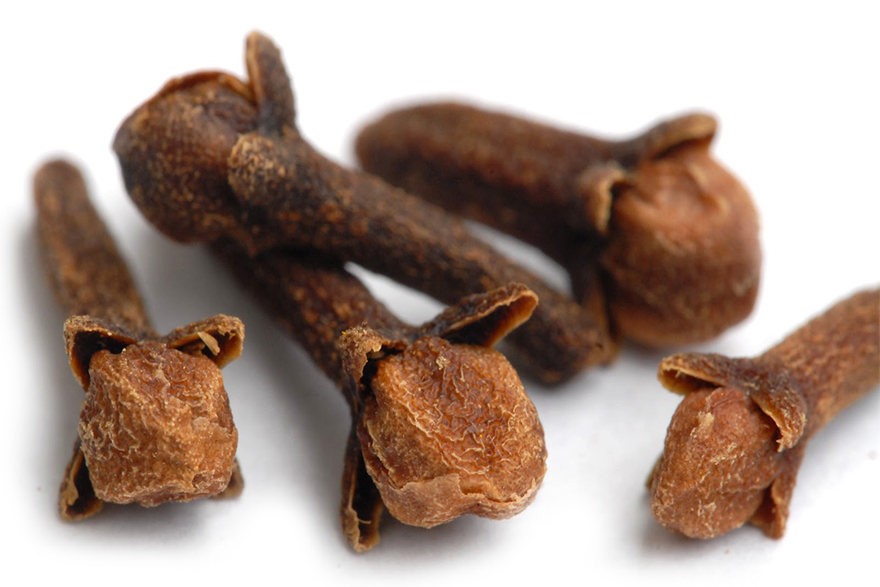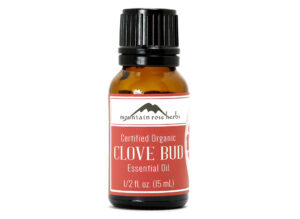Organic Clove Essential Oil
Organic clove essential oil is the oil distilled from the flower buds of the clove tree. The clove tree is a tropical evergreen tree that grows to heights of 25 to 33 feet and produces an abundance of flowers. The flowers are harvested in the bud stage and allowed to dry in the sun for several days before they are processed for essential oil. Cloves are a common spice used in baking and making confections, but cloves have also been used for medicinal purposes since ancient times.
What are the health benefits of organic clove essential oil?
Cloves have been used as an herbal remedy for a variety of conditions since ancient times. Some of the most common uses are:
- Digestive Disorders: Clove oil is used to treat indigestion, vomiting, diarrhea and upset stomaches.
- Dental Problems: Clove oil is used to treat a host of dental problems from toothaches to treating a dry socket after and extraction. It is thought to heal mouth and throat inflammation, freshen breath and relieve dental pain when having dental work performed.
- Respiratory Problems: Clove oil is used to treat coughs, to loosen congestion, and to treat bronchitis, sinusitis and asthma.
- Wounds & Abrasions: Clove oil is used to speed healing and prevent infection in cuts, wounds and abrasions.
- Acne and Aging Skin: Clove oil is used to treat acne and other skin irritations and is thought to slow visible signs of aging, such as fine wrinkles.
- Depression: Aromatherapy with clove essential oil may reduce stress and relieve depression.
Is there scientific evidence to support the health benefits of organic clove essential oil?
There have been several scientific studies showing the health benefits of clove essential oil, but some claims rely on anecdotal evidence and have not been verified with scientific studies. The following studies have confirmed the use of clove essential oil for health reasons.
- Anti-fungal Properties: A 2009 study from the University of Porto in Portugal revealed that clove oil has anti-fungal properties and is worthy of further study.
- Anti-Microbial Properties: A 2009 study conducted at Menoufiya University in Egypt concluded that clove essential oil demonstrated effectiveness against combating several bacteria commonly responsible for food poisoning and other digestive disorders.
- According to a 2007 review of “the chemical composition and biological activity of clove essential oils” published on NCBI, clove essential oil has the following properties
- Antimicrobial
- Antioxidant
- Anti-fungal
- Antiviral
- Anti-inflammatory
- Anesthetic
Organic clove essential oil has been shown to offer a host of health benefits and has even been reported to relieve depression and promote general well-being too, but those benefits have not been confirmed with medical studies, yet. If you want to try clove essential oil, do so with caution and read the instructions carefully. The oil may cause skin irritations if applied full strength.
Buy Organic Clove Bud Essential Oil
Our organic clove bud essential oil is a middle note steam distilled from the buds of Syzygium aromaticum. Cloves are the flower bud of an evergreen tree that is native to Indonesia, and it can now be found growing within Madagascar, Sri Lanka, Kenya, Tanzania, and China.
This oil is emotionally balancing and offers clarity and a stimulating atmosphere. It adds warmth to diffuser and perfume blends and can be used in massage oil, salves, and other body care formulations.
Aroma
It is spicy and pungent with dry, slight sweet and fruity notes that are characteristic to dried clove buds.
Constituents
This oil is primarily composed of eugenol, between 70-85%, as well as eugenyl acetate, and β-caryophyllene. Eugenol will also be found in cinnamon leaf, cinnamon bark, and bay laurel. Eugenyl acetate is also in cinnamon leaf, and β-caryophyllene is in copaiba balsam, black pepper, and ylang ylang.
Blending and Uses
This oil is often used in autumn themed diffuser, perfume, or aroma spray blends. Combine with ginger, cardamom, and cinnamon to awaken the senses and bring comfort. Clove and orange is a classic wintertime combination, and blending with Virginia cedarwood and juniper berry offers more evergreen notes. Vanilla or peru balsam are aromatically vibrant and sweet combinations for clove in perfumes. In contrast it can also be paired with bright fruity oils like grapefruit, litsea cubeba, and ylang ylang.
Massage oil or salve blends with clove oil can be used for occasional aches with other helpful oils like lavender, rosemary, cypress, or black pepper. Clove can also be combined with peppermint or fennel oils to gently rub on the abdomen for digestive discomfort. Use it in soaps with black spruce, spearmint, or tangerine. It is included in “four thieves” style blends like our Shield Blend, for its cleansing properties, and can be added to simple surface cleaning recipes with lemon oil.
Clove bud oil is quite pungent and should be used sparingly in any blend. Start with one drop at a time when adding to perfume or topical formulations so it does not become overpowering or irritating to skin. Slowly add more oil to achieve your desired results.
Packaging
1/2 oz. and 1 oz. essential oils are packaged in amber glass bottles with drop reducers for easy application. Larger sizes are packaged in amber screw cap bottles and do not come with reducers or droppers.
Safety
This oil may interact with certain drugs, may contain methyleugenol, and can cause skin sensitization. Never use essential oils undiluted, in eyes or mucus membranes. Do not take internally unless working with a qualified healthcare practitioner. Keep away from children and pets.
Before using perform a small patch test on your inner forearm or back. Apply a small quantity of diluted essential oil and cover with a bandage. If you experience any irritation use carrier oil or cream to further dilute the essential oil, and then wash with soap and water. If no irritation occurs after 48 hours it is safe to use on your skin.


